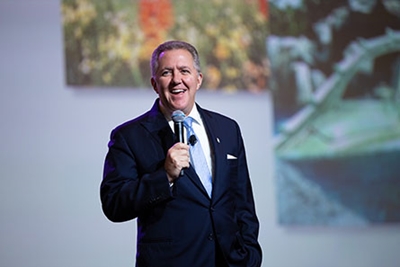Following Chambers' opening remarks, IIA Global Chairman Naohiro Mouri presented three awards in front of a crowd of 2,500 attendees. Nancy Haig won the John B. Thurston Award for her article, "Your Personal Brand," in the February 2018 issue of Internal Auditor magazine. Lawrence Harrington and Philip Tarling both received the Victor Z. Brink Distinguished Service Award. Gerald Cox received the William G. Bishop III, CIA Lifetime Achievement Award.
Moments later, Dennis Snow, president of Snow & Associates Inc., took the stage to talk about "Performance Excellence: The Employee Factor" and how to engage employees to deliver outstanding customer service. Snow, who had a 20-year career with Walt Disney World, focused on customer experience, performance excellence, and leadership. He outlined four principles that can create loyalty and performance excellence that is "worth every moment of effort you put into it."
Principle 1: Clearly Define the Customer Experience
Snow advised attendees to ask themselves, "Who are my stakeholders within the organization? What do we want their experience to be?"
"That's your brand," Snow says. "What three things do you want your stakeholders to say about the value you bring to the organization in the service you provide?" Is it that you're highly responsive? Your follow-through was outstanding? Do you anticipate their needs?
The customer experience must be defined in terms of employee behaviors, Snow explains. "What needs to happen to have them say those three things?" He says those behaviors need to be embedded in the culture.
Principle 2: Know What Frustrates Your Customers — and Do Something About It
Snow says far too many organizations know exactly what frustrates customers but don't do anything about it. He suggests meeting quarterly as a team to ask, "What things frustrate our stakeholders and what can we do about it?" A better question might be, "What keeps our stakeholders up at night and what can we do about it?"
Principle 3: Hire the Right People
Before interviewing people, leaders should determine what qualities make a superstar a superstar. Snow says identifying those qualities the organization wants in an employee can create a benchmark in the hiring process. For example, are managers seeing and hearing those qualities through the candidate's behavior in the interview?
"The interviewing selection process should model the culture of your organization," he says. "Every detail enhances or detracts from the culture of the organization. Are you demonstrating your values and culture during the interview process?"
Principle 4: Train and Communicate Relentlessly
Organizations can never assume their people get it, Snow warns. They can't put posters on the wall and say that's it.
"You have to be relentless about training and communication," he stresses. "You need to be very clear about what your expectations are." Snow says effective training and communication builds pride in the organization, ensures that the employee understands the true product, and guarantees that the employee knows what's expected.
When it comes to training, never let a coaching moment go, Snow advises. And it's important to never let a recognition moment go. "When our people feel like we sincerely appreciate what they do, the most powerful thing we can do is acknowledge that performance," he says. "The most effective recognition is all about emotion. We lock in performance excellence."
Whether it's at Disney World or within internal audit, these are the principles that create loyalty. "When we do these things consistently and well, the outcome is stakeholder loyalty," Snow says.



